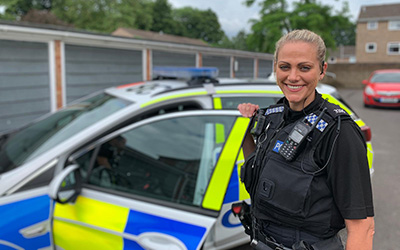Meet PC Jenna Caswell

Role: Response Team
Age at joining: 34
Length of Service: 2 years
Why did you join the police in your thirties?
I definitely don’t come from a policing background, my Grandfather was from the travelling community, he always valued honesty and respected the police. It’s something I always wanted to do. Our family have many traveller traditions and I was brought up to independent from a very young age, I left home at 17 and had my family young – I knew policing would be demanding and wanted to raise my children before committing myself to the career. Much of my family still follow traveller traditions, some were shocked when I joined but thankfully supportive of my choice.
What did you do before joining the service?
I left school at 15 and owned a bakery with my mum before working in a Primary School with special needs children. I spent seven years working with kids who had ADHD, autism and disabilities. Working with the public and children prepared me well for the job. I was always someone who would help others, offer assistance if someone seemed to need it and policing is ultimately all about helping people.
Changing career can be daunting, how did you find it?
Not easy, I had to gain Level 3 qualifications in order to apply and going back to study was not easy for me at all, luckily my Head Teacher was supportive and encouraging which got me through. I found the assessment day really tough though. When I joined we were a cohort of 18, with 6 women including myself and I was the oldest – we all supported each other. The paperwork and case files side of things I found particularly hard (and still do), I was diagnosed with dyslexia in the job and that ensured I got the appropriate support, it’s a crucial part of the job that needs to be done right in order to ensure we can take a case to court and secure a conviction. There is A LOT of paperwork, people perhaps don’t realise this but I take my time, seek advice and support to get it right.
How were your first few months on response?
Tough, no-one can prepare you for what you are exposed to – you really do see a completely different side of life. It’s not what you see on TV, it’s more intense and raw because it’s real. You will see the unexpected and people living differently to you. At the start when you’re trying to learn everything it can feel overwhelming. I must admit I had a wobble and wondered if I’d made the right decision. The more you do, the more you understand your powers and the policies, the greater your confidence grows and the better officer you become.
What’s a typical week of response?
There isn’t one, honestly no two jobs are the same. My first shift on response was Christmas Eve 2019 and I went straight to a sudden death. I’ve had to deal with several sudden deaths since then including suicides, drug related accidental deaths, young children. We respond to everything from burglaries and domestics to incidents related to mental health issues. About six months into the job we were responding to a domestic between a father and son, on arrival I was rugby tackled to the ground by the son (a large, agitated 15-year old) and had the wind knocked right out of me. It took several officers to subdue him in the end. My back was badly bruised – he was arrested, charged and I recovered. You need to be prepared, rely on your training and the support around you.
What have been the highlights?
I loved my response driving course, it’s was an intense three weeks but completely exhilarating.
How do you cope with the job?
I use my journey home to reflect on the shift, process what I have seen and experienced, then leave it at the door. Having good support is important both in and out of work. My team are great, there is strong camaraderie, everyone looks out for each other. There is a good welfare focus at a team and a force level.
How has it been for your family?
It’s not been easy for them. Suddenly mum was working weekends, nights and longer hours, it wasn’t something we were used to and it took us all time to adjust. It’s tough missing family events or planned evenings with friends when shifts extend. You feel like you’re letting people down, but luckily I am supported and encouraged. You must have a good support system at home.
What are the key skills that make a good police officer?
Having an ability to communicate with people from all backgrounds and walks of life is really important.
You need to be adaptable and flexible too, because there will be last minute duty changes that take you to other areas of the force.
What’s next for you?
There are so many opportunities to consider. Next for me though is my public order training later in the year, I’m looking forward to that.
What would you say to others considering a career in the police?
Go for it, I really enjoy my job. It’s very rewarding – the good days definitely outweigh the bad.
Thames Valley Police (TVP) is actively looking for people to be the difference they want to see in their communities, as we re-open Police Officer recruitment. To find out more about a policing career with TVP – including the realities of working on response, initial training, and to register your interest to become a Police Officer please visit our Police Officer page.


 Facebook
Facebook
 Twitter
Twitter
 Linkedin
Linkedin
 Instagram
Instagram